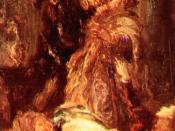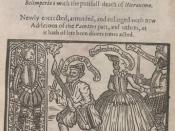In Hamlet by Shakespeare, the implications of double meanings and deceptions are conglomerated in such a way that a literary cycle is circumvented. The literary cycle by definition is the conveyance of a theme through consistent usage of literary devices through out a literary work. By doing so, Shakespeare produces an atmosphere of contentment and worried unease. The irony of these two antagonistic elements is relevant in the sense that the stream of conscience of King Claudius: the politician, the penitent, the tragedy is explored. Shakespeare perplexes just enough for it to be valued when a resolution occurs. Shakespeare incorporates asides in Hamlet to create a contradictory mood, and then counters with play wide themes to serves as lighthouses for the murky waters of literary dubiety.
The paradox of having contradictory moods is purposely perpetuated by Shakespeare constant manipulation of the King. ?With mirth in funeral, and with dirge in marriage/In equal scale weighing delight, and dole.?
(1.2.12-13) These ideas are so conflicted that they sit awkwardly with each other, and hence the disquietude mood is inaugurated. Shakespeare then simply perpetuates this mood with Hamlet. One other literary element that Shakespeare uses to convey a mood of apprehension is asides. At any point in the play where there is one, the person giving it, is telling the audience information that somewhat contradicts with their actions. The king for example actually exhibiting remorse , directly contradicts with the knowing unwillingness to do anything about it. ?How smart is a lash that speech doth give my conscience.? (3.1.59) ?O heavy burden!? ( 3.1.63) ?Forgive me my foul murder?/That cannot be, since I am still possess?d/of those effects for which I did the murder-? (3.3.63-65)?.May one be pardon?d and retain the offence??( 3.3.67) ?O wretched state.? (3.3.78) ?My words fly up,


